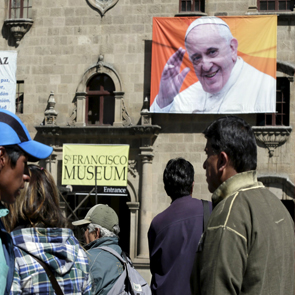Hundreds of thousands of people have attended anti-government demonstrations across Ecuador, as Pope Francis prepares to visit the country next week.
The protests against new tax proposals by President Rafael Correa, took place as the Government scrambles to make savings to offset huge declines in oil revenues.
The papal visit has taken on a political tone, as official buildings in Guayaquil displayed huge posters with papal messages about wealth and inequality in advance of the protests.
Meanwhile, demonstrators displayed banners accusing the Government of “abuse” and claiming it was using the Pope as propaganda.
The Ecuadorean Government plans to impose a tax of 77.5 per cent on inheritances and 75 per cent on capital gains from property. The move, regarded as a leap towards a more socialist approach, is very unpopular in a country where most businesses are family-owned.
“Ensure humanity is served by wealth, not ruled by it,” read a papal message promoted by the Government last week. However, Mr Correa temporarily withdrew his proposals from parliament in an effort to avoid tension during the papal visit.
The Archbishop of Quito, Fausto Travez, said he hoped that the visit would calm the situation. “We will come to an agreement because the Pope is a messenger of peace, joy, justice and goodness,” he said.
The Pope will visit Ecuador, Bolivia and Paraguay during a six-day visit to South America, beginning on Sunday. All three countries are affected by widespread poverty and Francis is extremely popular both because he is Argentinian and because of his focus on the poor.
His visit to Paraguay comes less than a year since the Vatican dismissed a prominent Paraguayan bishop over misuse of funds. The Diocese of Ciudad del Este continues to struggle to pay off US$800,000 in debt left by Bishop Rogelio Livieres Plano who is accused of using money intended for charitable causes for his own means.
However, the bishop’s supporters in Paraguay believe that he was ousted because of his conservative views and his membership of Opus Dei.
Poverty has caused huge numbers of Paraguayans to migrate to neighbouring Argentina in recent decades. Paraguayans form some of the poorest and most marginalised communities in Argentina and during his time in Buenos Aires the Pope became familiar with them.
He has therefore agreed to recite the Our Father in Guaraní, the indigenous Tupian language of Paraguay, during Masses in the country.
During his trip to Bolivia, the Pope will visit the notorious Palmasola prison. Sales of alcohol will be prohibited in parts of the country during the Pope’s visit, while the Pope himself has asked to be provided with coca leaves to chew to help him acclimatise to the altitude when he arrives. Ecuador and Paraguay have declared two-day bank holidays during the visit, to allow as many people as possible the chance to see Francis.
Above: People walk past an image of Pope Francis in La Paz, Bolivia, 30 June. The pope will visit Bolivia July 8-10. Photo: CNS photo/David Mercado, Reuters




 Loading ...
Loading ...